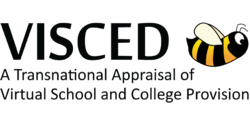Welcome to the Virtual Education Wiki ~ Open Education Wiki
Main Page
THIS WIKI IS NOW FROZEN - YOU CAN EDIT BUT FURTHER EDITS WILL NOT BE TRANSFERRED TO THE ARCHIVE SITE UNLESS YOU MAKE SPECIAL ARRANGEMENTS
For the archive site, see http://virtual-learning.referata.com which aims to hold an exact copy of this site. At present we believe that all content pages have been transferred but most files of images and diagrams are still in process of migration, which will take several weeks. At present users are welcome to browse it, and we appreciate any feedback
This wiki will continue to accrete a few updates from the core team - especially reports. If we detect any users editing we shall endeavour to categorise the edits in a way which means that we can do one final transfer in January 2017.
Paul Bacsich 11-12 October 2016
CHANGES IN 2016
This wiki is the largest professional wiki in the world devoted to virtual learning in education - at all levels (schools, colleges and universities) including informal learning, open learning/OER and distance learning.
Welcome to the entry page of this wiki where you will find information about virtual schools, colleges and universities. The idea behind this wiki is to create an open and public space where researchers can share information about virtual developments in various different educational sectors. It is supported and maintained by a growing community of researchers and is aimed at stakeholders, researchers and practitioners who would like to have easy access to the latest information about how the virtual phenomenon is manifesting itself in schools, colleges and universities around the world.
In 2016 it is expected that there will be much closer integration of the material on this wiki with that on the POERUP wiki http://poerup.referata.com - which as far as feasible uses the same approach and naming scheme for its focus on OER and MOOCs. The wiki here will be closed some time in early summer 2017.
2015 news
New entry for Docentes On Line and updates for the Chile country report and Think Academy International Virtual School, by Michel Morales
9 July 2015 - updates to Armenia and Georgia
Key links
Funding
Funding to launch this wiki has come mainly from the Lifelong Learning Programme of the European Commission through projects relevant to virtual learning. In addition, a series of smaller initiatives and volunteer labour have aimed and continue to keep updating the material. (See in particular e-World and LUOERL.)
|
| ||
|
This wiki is currently maintained by the Exploitation Phase of the VISCED project on Virtual Schools and Colleges (funded by LLP in 2011 - 2012), which made an inventory and carried out a systematic review at international and national levels of innovative ICT-enhanced learning/teaching "Exemplar" initiatives and "e-mature" major secondary and post-secondary education providers for the 14-21 age group. For more details see http://www.virtualschoolsandcolleges.info/ VISCED enhanced Re.ViCa's earlier research work on this wiki on country reports and resources with research results relevant to virtual schools and exemplars. Read more here. |
Originally set up in 2007 by the Re.ViCa project on Virtual Campuses in universities and colleges (2007- 2009), this wiki started out with providing an inventory and showing the results of a systematic review of Virtual Campus initiatives of the past decade within higher education throughout the world. In 2009, Re.ViCa research pages on this wiki included over 300 categorised Programmes, Country reports, nine in-depth Institutional reports and a large number of related Resources (research projects, outputs, and publications). Read more here. |
POERUP has put some material on this wiki but most is on its own POERUP wiki
Disclaimer
The Editorial Team makes every effort to ensure, but does not guarantee, the accuracy of the information on this wiki, but we warmly invite anyone who sees incorrect information to let us know. You can read more information on this topic here.
|
This wiki was partly funded through the Re.ViCa project (2007-2009), then through the VISCED project (2011-2012), and finally though the POERUP project (2011-2014) with support from the European Commission through the Lifelong Learning Programme. The wiki reflects the views only of the authors, and the Commission cannot be held responsible for any use which may be made of the information contained therein. |


